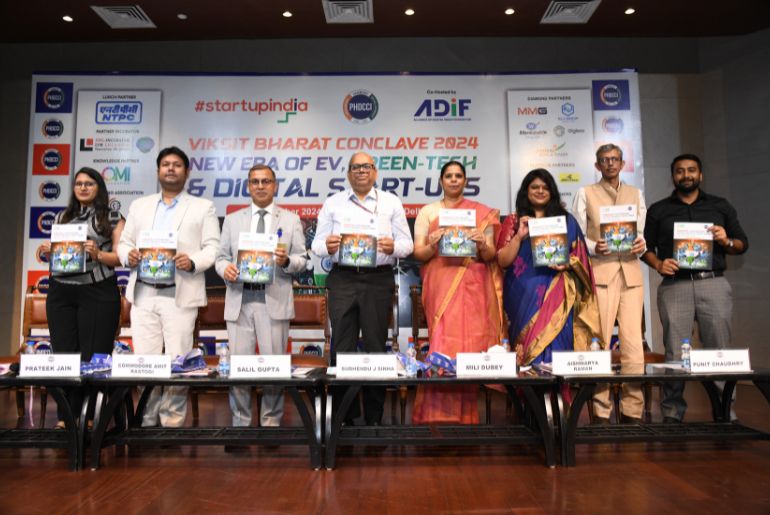As India accelerates its journey towards electric mobility, PHD Chamber of Commerce and Industry (PHDCCI), in collaboration with OMI Foundation, has unveiled a comprehensive report titled “Powering Startups and MSMEs for an EV-Ready India.” The report was launched by Shri Sudhendu J. Sinha, Advisor for Infrastructure Connectivity & Electric Mobility, NITI Aayog, and Cmde Amit Rastogi (Retd), Chairman & Managing Director, National Research Development Corporation at the Viksit Bharat Conclave 2024: New Era of EV, Green-Tech & Digital Startups at New Delhi.
The report offers a comprehensive analysis of India’s evolving EV ecosystem. It outlines key challenges for EV startups and Micro, Small, and Medium Enterprises (MSMEs)—including regulatory complexities, financing barriers, and scaling infrastructure—and presents strategic recommendations to address these obstacles.
With India’s Panchamrit goals focusing on addressing climate change and achieving sustainable environmental practices, Electric mobility – with its potential to decarbonise the mobility and energy sectors alike – is a low-hanging fruit. India’s vibrant startup ecosystem, now ranked third globally, has fostered over 700 EV startups as of now.
As India aims for 30% EV penetration by 2030, startups and MSMEs are playing a pivotal role in driving this transition. The knowledge report therefore highlights the critical contributions of startups and MSMEs in reshaping the EV landscape and offers strategic policy recommendations to ensure their sustainable growth.
Key Highlights of the Report:
- Innovation-Driven Growth: The report underscores how Indian EV startups, through innovations in battery technology, software solutions, and EV infrastructure, are leading the charge towards a cleaner, more sustainable future.
- Government Support: While central policies such as the Production Linked Incentive (PLI) scheme and FAME-II have created a foundation for growth, the report calls for more tailored schemes that directly address the needs of startups and MSMEs, particularly in the EV sector.
- Financial and Technological Access: Recommendations in the report also include expanding credit access, diversifying financing channels, and fostering collaborations between startups, incubators, and financial institutions to bridge the funding gap.
- Skill Development and Inclusivity: With a focus on skill-building and inclusion, the report emphasises the need for customised training programs and promoting the participation of women, marginalised communities, and vulnerable groups in the EV industry.
The report is expected to serve as a valuable resource for stakeholders across the EV value chain, from government agencies to investors, helping to shape policy reforms and drive the sustainable growth of startups and MSMEs in India’s electric mobility landscape.


